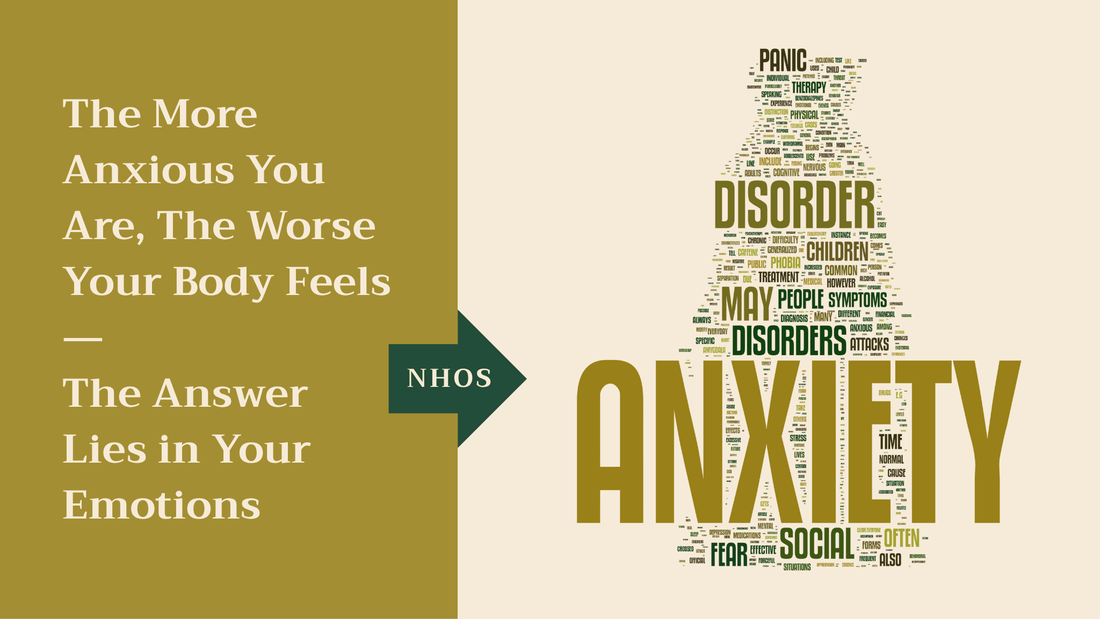
The More Anxious You Are, The Worse Your Body Feels — The Answer Lies in Your Emotions
Because your mind and body are more connected than you think.
😰 Ever Notice How Anxiety Feels Physical?
Tight chest. Racing heart. Upset stomach. Tension in your shoulders.
No, you’re not imagining it—anxiety doesn’t just live in your head; it lives in your body too.
In fact, your emotional state can have a powerful impact on your physical health.
Let’s take a closer look at why that happens—and how you can break the cycle.
🧠 What Exactly Is Anxiety?
Anxiety is your body’s natural response to stress or perceived danger.
It's like an internal alarm system designed to protect you—but sometimes, that alarm gets stuck in the “on” position.
When you feel anxious, your brain activates the fight-or-flight response, releasing stress hormones like cortisol and adrenaline. These chemicals prepare your body to react quickly… which is helpful if you’re running from a lion, but not so helpful when you’re just stuck in traffic or overthinking tomorrow’s meeting.
🩺 How Anxiety Affects Your Body
Chronic anxiety = chronic stress response. Over time, that takes a toll. Here's how:
❤️ Heart & Circulation
- Faster heart rate
- Higher blood pressure
- Increased risk of cardiovascular problems
😴 Sleep & Energy
- Trouble falling asleep
- Waking up tired, wired, or restless
- Fatigue even after "rest"
🍽️ Digestion
- Stomach cramps, bloating, nausea
- Changes in appetite
- Triggering IBS (irritable bowel syndrome) symptoms
💪 Muscles & Pain
- Neck, back, and shoulder tension
- Jaw clenching or grinding teeth
- Headaches and migraines
🧬 Immune System
- Weakened defenses against viruses
- Slower recovery from illness
- Increased inflammation
In short: when your mind is on edge, your body follows.
🛡️ How to Prevent (or Reduce) Anxiety’s Impact on Your Body
You don’t need to eliminate all stress—because life happens.
But you can train your body and brain to handle it better.
Here’s how:
1. Practice Daily Relaxation
- Deep breathing
- Meditation or mindfulness
- Gentle yoga or stretching
These signal your body to turn off fight-or-flight mode.
2. Move Your Body Regularly
Exercise boosts feel-good hormones like endorphins and helps burn off excess stress hormones. Even a 20-minute walk can work wonders.
3. Eat to Support Your Mood
- Omega-3s (from fish, flaxseeds)
- Leafy greens, berries, fermented foods
- Limit caffeine, sugar, and alcohol (they can worsen anxiety)
4. Get Serious About Sleep
Good sleep restores your nervous system and improves emotional resilience. Aim for 7–9 hours per night.
5. Limit Information Overload
Scrolling the news or social media nonstop? That’s a constant drip of stress. Set boundaries around screen time—your brain will thank you.
6. Talk It Out
You don’t have to carry emotional weight alone. Whether it’s a friend, therapist, or journal, letting feelings out is healthier than bottling them in.
💡 Final Thoughts: Listen to Your Emotions—They Show Up in Your Body
Anxiety isn't “just in your head”—it’s a full-body experience.
The aches, the fatigue, the stomach issues—they’re messages from your nervous system, not random problems.
The good news? You can learn to calm the storm.
When you take care of your mind, your body begins to feel the peace too.
So next time your body feels “off,” ask yourself:
“How am I really feeling inside?”
Your emotions just might be the missing clue.
Be kind to your mind, and your body will follow. One breath, one day, one moment at a time.
